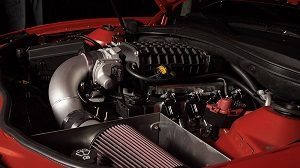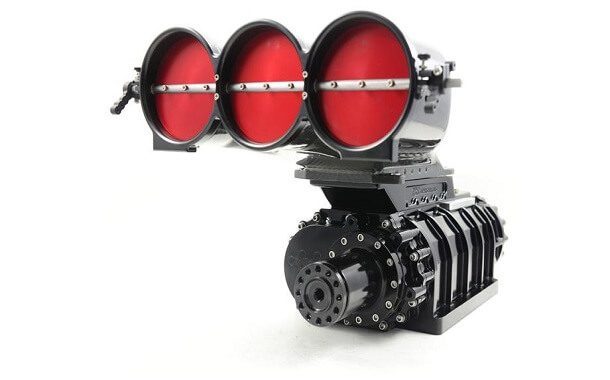Supercharger Installation Cost
Last Updated on December 29, 2023
Written by CPA Alec Pow | Content Reviewed by ![]() CFA Alexander Popinker
CFA Alexander Popinker
Increasing regulations in most countries around the world to reduce emissions from car exhaust have forced carmakers to use smaller cylinder engines. These small engines are economical and produce low emissions but customers expect performance similar to large cylinder engines. In order to create cars that are both high-performance and environmentally friendly, car manufacturers have introduced the method of supercharging the engines with superchargers.
How Much Does a Supercharger Installation Cost?
Compared to turbochargers, superchargers will determine the air from the engine to produce more power. This equipment is simple and easy to install on naturally aspired cars as they are belt-driven systems that draw power from the crankshaft. However, there are cars that come with superchargers installed directly from the factory.
If your car did not come with a preinstalled supercharger and you want to add one you have two options, either you install it by yourself or you hire a professional to do this job. Most people choose the second option because there are some technical skills required.
So, the supercharger installation cost depends on the auto shop you are going to and the type of installation. For example, you will have to pay anywhere between $510 and $11,000 for a basic installation.
These great price differences are determined by the type of supercharger as there are around six different models of superchargers on the market. For example, a Tacoma supercharger costs around $550, while for another brand you may pay more than $1,000. Here is a list of the costs of superchargers at some of the most popular manufacturers:
- 1995 Buick Riviera – $780;
- 1997 Pontiac Grand Prix – $760;
- 1999 Buick Park Avenue – $810;
- 2001 Nissan Frontier – $1,320;
- 2003 Mini Cooper – $1,910.
Supercharging details
Overcharging is a way of forcing more air into the engine than it normally would. Naturally aspirated engines have a continuous vacuum in the intake system, while the cylinders in the intake phase draw air beyond the carburetor. Forced induction motors use a pump, often a turbocharger or supercharger, to force air into the intake. Because air is a compressible gas, the result of pressurizing the intake and cylinders is even more oxygen, and more oxygen mixed with a larger amount of fuel results in more horsepower and higher performance.
You might also like our articles about the cost of twin-turbo installation, Flowmaster exhaust system installation, or port and polish heads service.
Supercharging can be used in two ways. For super sports cars, where maximum performance is desired and fuel consumption does not matter, and for small engines where forced induction can raise the power of much larger cylinder engines, inefficient but naturally aspirated. The overall result is a low-fueled car without sacrificing performance.
Types of superchargers
You can choose one of three types of superchargers such as root, centrifugal, and twin-screw. All of them have their advantages and disadvantages. For example, root chargers are more reliable and less expensive, but usually, they are compatible only with one vehicle make and model. Also, centrifugal superchargers are easier to find but are more expensive.
Root superchargers
The root type of supercharger is typically found on top or near the engine. These units make your engine run smoother and more efficiently by helping it inhale large quantities of air. They work quickly, so you can get that performance boost right away.
The integration of a root supercharger into the intake manifold is what makes them so easy and cheaper to replace. This also means that if you damage your unit, there’s not much involved in fixing it compared with other types of turbines.
Centrifugal superchargers
Centrifugal superchargers use a powerful and fast-moving impeller to increase the pressure of air in their system. The high speeds help them deliver power quickly, while also being able to operate at low volumes.
These high-end superchargers are exclusively designed for race cars and give you the most efficient performance boost. Though, they’re very expensive to install which makes them challenging in terms of accessibility.
Luckily, there’s a street-legal variant. Available as aftermarket accessories and only usable for moderate horsepower gains compared to their centrifugal counterparts.
Twin-screw superchargers
Twin-screw superchargers are the most expensive and often not legal on the street. They typically have rotor lobes that trap air to be compressed by a taper in order for it to enter into your engine, but these can make some pretty awesome sounds.
What are the extra costs?
 The upfront cost of your new supercharger is just the beginning. You need to factor in things like fuel costs, maintenance fees, and more when deciding if it’s worth installing one on our own cars or not.
The upfront cost of your new supercharger is just the beginning. You need to factor in things like fuel costs, maintenance fees, and more when deciding if it’s worth installing one on our own cars or not.
Gearing up your car to pull more than its weight can cause serious damage and wear on components, like the engine. This is why you should invest in a high-quality charger that will last for years with minimal maintenance needs. Otherwise, a cheap charger may result in tune-up and repair costs of thousands of dollars.
You should purchase a warranty for your supercharger. It’s important that you’re getting something reputable because most of these warranties offer standard service and extension options.
Important things to consider
The right supercharger can make your car run like new. There are many to choose from, but only those made by reputable brands will work for you and meet all of its requirements.
Supercharging is a great way to get more power out of your car, but if you don’t have the right vehicle for it then everything will be wasted. Make sure that any superchargers installed are matched with what’s already on wheels before investing in one. For example, for your daily drive, you will want something street legal. The difference between a street, show, and drag racing supercharger is that the latter two will give your car an extra boost while they may prevent you from legally driving on public roads.
The difference between superchargers and turbochargers
Car manufacturers generally use two ways to supercharge engines. These two types of forced induction work slightly differently and have different advantages and disadvantages.
An ordinary turbocharger is a centrifugal pump driven by exhaust gases. Centrifugal pumps have variable pressures, which means that their efficiency depends on how fast the car is driven and how fast the engine is running.
An ordinary supercharger is a positive pressure pump driven mechanically by the crankshaft of the engine through a belt. Positive pressure pumps compress the same amount of air at each engine speed. More recently, with the introduction of hybrid electric vehicles, a new way of operating forced induction pumps has been found. Instead of exhaust gases or belts, these pumps are driven by an electric motor. For example, Formula 1 engines use an electric motor to drive the turbocharger at low revs, and at high revs, the same turbocharger is driven by the exhaust.
How can I save money?
When you’re looking for a supercharger, the right charger can make all of the difference in pricing. If your vehicle is made by a renowned manufacturer like Toyota or General Motors who offer great prices on parts already then be sure to check out their range before going anywhere else. This way you will save time and money.
There are other options besides just buying the supercharger from the car’s manufacturer. You can find a supercharger that will suit your needs and desires for less money than what you would pay if purchasing through them directly.
There are different types of chargers for every type and model of car, so you can use whichever one matches your needs.
Your new supercharger will work best with your vehicle if you know its make, model, and year. You may also want to note the engine size or type as this info directly ties into what kind of charger is installed.


Leave a Reply
Want to join the discussion?Feel free to contribute!